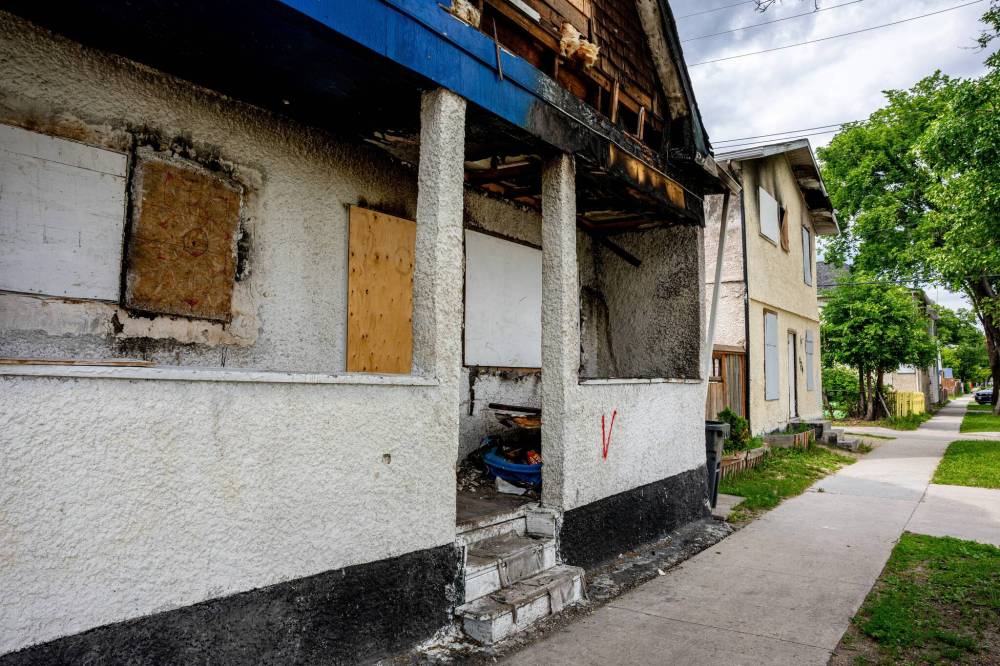
The City of Winnipeg could take over vacant properties sooner and offer deep discounts on lots to attract more affordable housing, as boarded-up and burned-out buildings plague parts of Winnipeg.
One change would permit lots to be sold for as little as $1 to non-profit housing providers to build affordable housing in any part of the city, pending council approval. Another would give the city’s chief administrative officer the authority to approve land acquisition programs for vacant and/or dilapidated properties, to speed up the transfer of lots to the city from owners who no longer want them.
NIC ADAM / FREE PRESS FILES
Four houses sit vacant on Powers Avenue. The William Whyte Neighbourhood Association issued a public plea for help, noting the presence of at least 42 burned buildings in the area.
A residents’ group that recently called on the city to help combat a surge in vacant property fires welcomed the proposal.
“I think that a lot of these property owners don’t actually want their properties anymore but they know the city will come and take it for (unpaid) taxes. But that process (can take) five, six (years). That’s why a lot of these properties are sitting like they are. If you’re a responsible owner, hopefully, you’ll sign the property over to the City of Winnipeg and you’ll be able to walk away from it,” said Darrell Warren, president of the William Whyte Neighbourhood Association.
Warren said some owners may also choose to surrender properties to escape the price of cleaning them up.
On June 21, the neighbourhood association issued a public plea for help, noting the presence of at least 42 burned buildings in the area, including four on Powers Street alone.
Warren said there’s still a need for urgent action, after two more fires took place (one at another vacant home) since that date. He said a vacant house in the 400 block of Burrows Avenue was broken into multiple times before it was set on fire last week.
Warren suggests the city, province and feds provide funding to clean up any properties the city takes over.
MIKE DEAL / WINNIPEG FREE PRESS FILES
Darrell Warren, president of the William Whyte Neighbourhood Association.
“Demolition is a very costly thing … if we can sell a property for $1 (to be renovated) and get a family in there, that’s great. Then the threat’s gone down when there’s somebody actually living in the house,” he said.
Coun. Cindy Gilroy, who has long lobbied the city to clean up rubble-filled lots left behind by fires, welcomed the proposal.
“Making it easier for us to take over derelict (properties) would be ideal … (It) is a really good step to encourage owners to get rid of properties” they no longer want, said Gilroy (Daniel McIntyre).
Some property owners may welcome the option to quickly dispose of an unused property, instead of slowly working through a bureaucratic process and seeking approval from elected officials, which can take months to complete, she said.
The city has already offered some reduced prices (as low as $1 each) for lots to support affordable home construction within “housing improvement zones” in the William Whyte, Spence, West Broadway, Centennial and North Point Douglas neighbourhoods. Gilroy said expanding the option is worthwhile.
“I think that a lot of these property owners don’t actually want their properties anymore but they know the city will come and take it for (unpaid) taxes. But that process (can take) five, six (years).”–Darrell Warren
“We need to make sure that in all areas of Winnipeg, there is affordable housing,” she said.
Coun. Sherri Rollins, chairwoman of council’s property and development committee, said the changes would let the city take over problem properties sooner.
“It (could) move at the speed of business. Having to wait for a (city committee meeting to hear a proposal) … has been an issue,” said Rollins (Fort Rouge-East Fort Garry).
She said the call to transfer some powers from elected officials to city staff is warranted for key priorities, like creating affordable housing, but also warrants some council scrutiny.
“It isn’t a light thing to take powers away from council,” said Rollins.
Shauna MacKinnon, a member of the Right to Housing Coalition, said the steps could help attract more affordable home construction. However, the city must also ensure rent-geared-to-income housing units are included to help Winnipeggers living on the lowest incomes, she said.
“(For) very low-rent units, there is virtually nothing available for under $750 a month,” said MacKinnon, suggesting the city seek provincial subsidies to support deeply affordable rents.
The coalition estimates about 7,500 rent-geared-to-income units are needed in Winnipeg, plus 5,000 more that serve homeless people.
A city spokesman said a small number of property owners have expressed interest in donating their “distressed” properties to the city.
“In some cases, it is just a matter of time before the city acquires a distressed property through tax sale … but the tax sale process can take years. The policy change could allow properties to be redeveloped (on) a more timely basis and reduce the number of vacant buildings in the city,” wrote Kalen Qually.
The city monitors 695 properties through its vacant buildings bylaw, said Qually.
The changes would also allow the city’s CAO to accept land donations in order to preserve natural habitats, which the report says would support a city council goal to add more green space.
X: @joyanne_pursaga

Joyanne Pursaga
Reporter
Joyanne is city hall reporter for the Winnipeg Free Press. A reporter since 2004, she began covering politics exclusively in 2012, writing on city hall and the Manitoba Legislature for the Winnipeg Sun before joining the Free Press in early 2020. Read more about Joyanne.
Every piece of reporting Joyanne produces is reviewed by an editing team before it is posted online or published in print — part of the Free Press‘s tradition, since 1872, of producing reliable independent journalism. Read more about Free Press’s history and mandate, and learn how our newsroom operates.
Our newsroom depends on a growing audience of readers to power our journalism. If you are not a paid reader, please consider becoming a subscriber.
Our newsroom depends on its audience of readers to power our journalism. Thank you for your support.


